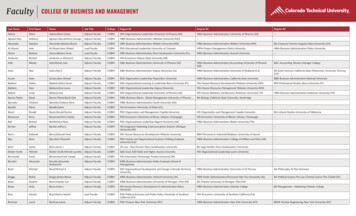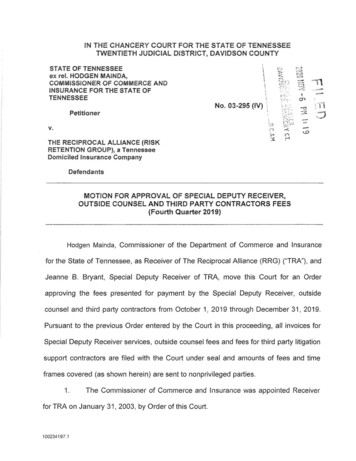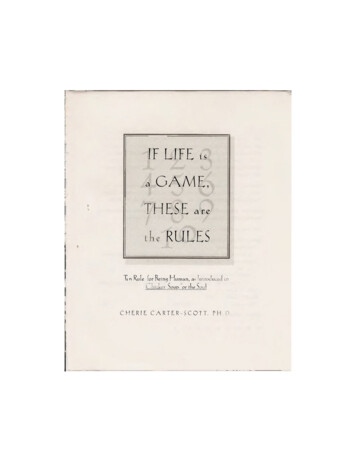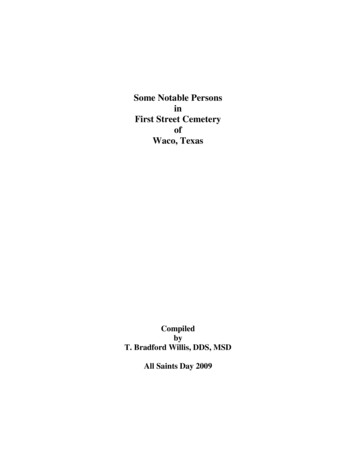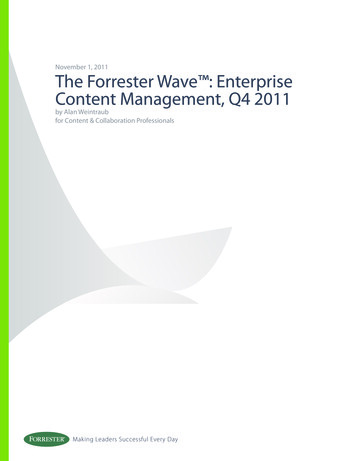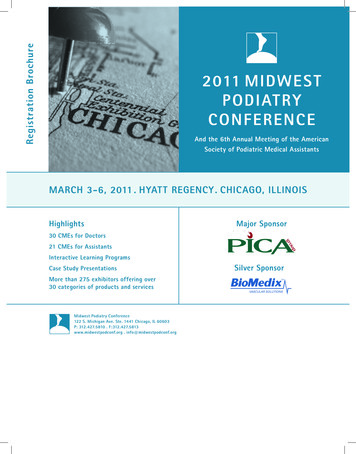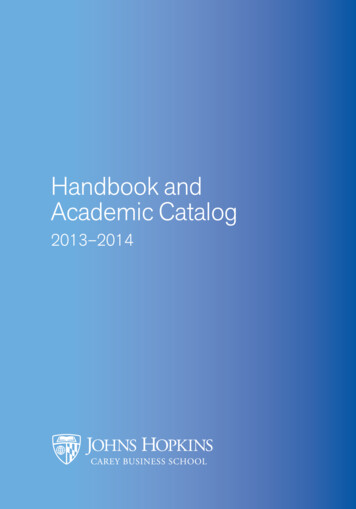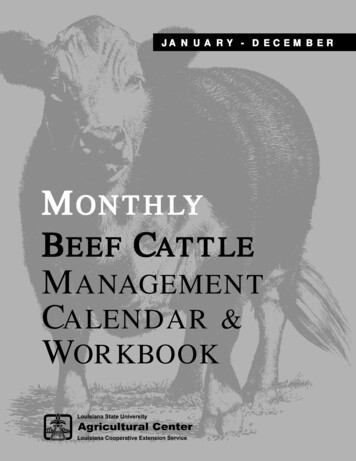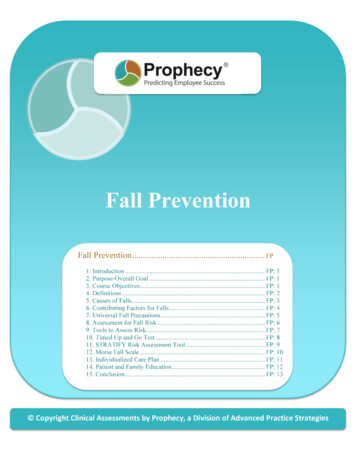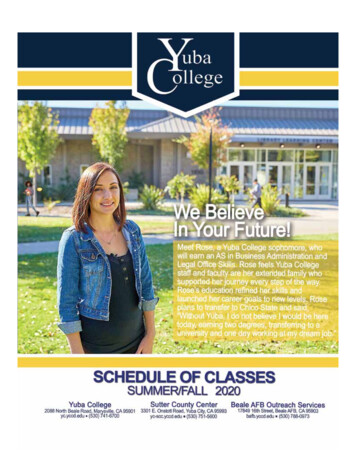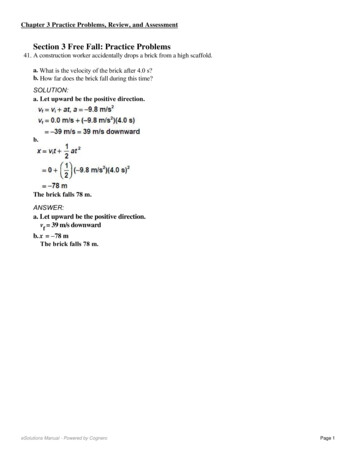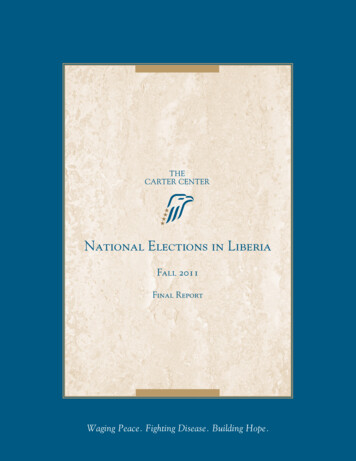
Transcription
National Elections in LiberiaFall 2011Final ReportWaging Peace. Fighting Disease. Building Hope.
The Carter Center strives to relieve sufferingby advancing peace and health worldwide; it seeksto prevent and resolve conflicts, enhance freedom anddemocracy, and protect and promote human rights worldwide.
National Elections in LiberiaFall 2011Final ReportOne Copenhill453 Freedom ParkwayAtlanta, GA 30307(404) 420-5188Fax (404) 420-5196www.cartercenter.org
The Carter Center
The Carter CenterContentsForeword . . . . . . . . . . . . . . . . . . . . . . . . . . . . . . . . . . . 2Executive Summary . . . . . . . . . . . . . . . . . . . . . . . . . . 4The Carter Center in Liberia . . . . . . . . . . . . . . . . . . 7Election Observation Methodology. . . . . . . . . . . . . 9Historical and Political Background . . . . . . . . . . . 14Electoral Institutions and theFramework for the Elections . . . . . . . . . . . . . . . . . 17Legal Framework for the Elections . . . . . . . . . . . . 17The Aug. 23 National Referendum . . . . . . . . . . . 19Electoral System. . . . . . . . . . . . . . . . . . . . . . . . . . 20Election Management. . . . . . . . . . . . . . . . . . . . . . 21Electoral Dispute Resolution. . . . . . . . . . . . . . . . . 22Constituency Demarcation. . . . . . . . . . . . . . . . . . 23Pre-election Developments . . . . . . . . . . . . . . . . . . . 24Voter Registration. . . . . . . . . . . . . . . . . . . . . . . . . 24Voter Education. . . . . . . . . . . . . . . . . . . . . . . . . . 25Candidates, Parties, and Campaigns . . . . . . . . . . 26Campaign Finance. . . . . . . . . . . . . . . . . . . . . . . . 29The Media. . . . . . . . . . . . . . . . . . . . . . . . . . . . . . 30Electoral Dispute Resolution. . . . . . . . . . . . . . . . . 31Election Day — Presidential andLegislative Elections on Oct. 11 . . . . . . . . . . . . . . . 32Opening. . . . . . . . . . . . . . . . . . . . . . . . . . . . . . . . 32Polling. . . . . . . . . . . . . . . . . . . . . . . . . . . . . . . . . 32Closing and Counting. . . . . . . . . . . . . . . . . . . . . . 34Participation of Women. . . . . . . . . . . . . . . . . . . . 35Domestic and International Observers . . . . . . . . . 35Postelection Developments . . . . . . . . . . . . . . . . . . . 37The Tally Process. . . . . . . . . . . . . . . . . . . . . . . . . 37Election Results . . . . . . . . . . . . . . . . . . . . . . . . . . 38Electoral Dispute Resolution. . . . . . . . . . . . . . . . . 39Runoff Developments . . . . . . . . . . . . . . . . . . . . . . . 43CDC Boycott. . . . . . . . . . . . . . . . . . . . . . . . . . . . 43Violence on Nov. 7 . . . . . . . . . . . . . . . . . . . . . . . 44The Media. . . . . . . . . . . . . . . . . . . . . . . . . . . . . . 45Voter Education. . . . . . . . . . . . . . . . . . . . . . . . . . 47Election Day — PresidentialRunoff Election of Nov. 8 . . . . . . . . . . . . . . . . . . . 48Opening. . . . . . . . . . . . . . . . . . . . . . . . . . . . . . . . 48Polling. . . . . . . . . . . . . . . . . . . . . . . . . . . . . . . . . 48Closing. . . . . . . . . . . . . . . . . . . . . . . . . . . . . . . . . 49Postrunoff Election Developments . . . . . . . . . . . . . 50The Tally Process. . . . . . . . . . . . . . . . . . . . . . . . . 50Anomalous Results inGrand Gedeh County . . . . . . . . . . . . . . . . . . . . . 51Independent Commission of Inquiry. . . . . . . . . . . 52Runoff Election Results . . . . . . . . . . . . . . . . . . . . 53Conclusions and Recommendations . . . . . . . . . . . . 54Appendix A: Acknowledgments . . . . . . . . . . . . . . 58Appendix B: List of Delegationand Program Staff . . . . . . . . . . . . . . . . . . . . . . . . . . 60Appendix C: Terms and Abbreviations . . . . . . . . . 63Appendix D: Public Statements . . . . . . . . . . . . . . . 64Appendix E: Deployment Plans . . . . . . . . . . . . . . 115Appendix F: Checklists . . . . . . . . . . . . . . . . . . . . . 119Appendix G: Letter of Invitation . . . . . . . . . . . . . 131Appendix H: Official NEC Results . . . . . . . . . . . 132
The Carter CenterForewordBy John StremlauVice President for Peace Programs, The Carter CenterCo-leader of Election Observation Mission to LiberiaLDeborah Hakesiberia’s 2011 national elections were anotherimportant step in establishing the foundationfor sustainable democratic governance, nationalintegration, and economic development in a countrystill struggling to overcome the wreckage of war.The Carter Center was pleased to be invitedto observe these elections by Liberia’s NationalElections Commission (NEC) and to be cordiallyreceived by the leaders of all the main political parties, including President Ellen Johnson Sirleaf andher chief opponent, Ambassador Winston Tubman.Throughout the process, our observers benefited fromthe warm hospitality and help we received from theLiberian people and from the voters and poll workers who patiently and peacefully demonstrated theirpersonal commitment to this most basic democraticright.Our mission was led by former Nigerian Head ofState General Dr. Yakubu Gowon, whose magnanimous policy of “no victors, no vanquished” followinghis country’s terrible civil war is admired in LiberiaDr. John Stremlau participates in a meeting with the heads ofother international observer delegations.2as elsewhere in Africa and beyond. We were veryfortunate to partner with the Electoral Institute forSustainable Democracy in Africa (EISA), which isbased in South Africa but has become a leader amongnongovernmental international election observerorganizations across Africa. For each round of theelections, we jointly deployed more than 50 observers from approximately 25 countries, including 16African countries.We wish to thank the U.S. government andHumanity United for supporting the Carter Center’swork in Liberia financially and U.S. AmbassadorLinda Thomas-Greenfield and her staff for theirtimely assistance to the mission. The United NationsMission in Liberia (UNMIL) provided valuablelogistical support and advice, and we gratefullyacknowledge the personal role of the secretarygeneral’s special representative, Ellen MargretheLøj, in facilitating this assistance. We also benefitedfrom collegial advice and consultation among theother, predominantly African, international observermissions to Liberia, notably the delegations fromthe Economic Community of West African States(ECOWAS) and the African Union.In addition to the robust African and internationalinterest in Liberia’s election, we also are encouragedby the degree of citizen engagement. More than 60Liberian civil society organizations were accreditedby the NEC and subsequently deployed severalthousand observers, with a presence at 75 percentof the polling stations Carter Center–EISA observersvisited on the day of the election. At the pinnacleof this massive domestic effort was the ElectionCoordinating Committee (ECC), an umbrella organization with a large cohort of trained observers who, inturn, helped ensure that Liberian observers followedthe same agreed-upon set of election observationprinciples that the major international nongovernmental and intergovernmental observer groupsaffirmed at the United Nations in 2005.
The Carter CenterNational Elections in LiberiaDemocratic governance is new to Liberia.regional and world affairs. The Liberian people appearAlthough it is Africa’s oldest independent republic,committed to a different path, but we all know that againing international recognition from the Unitedcredible election is not enough. Constitutional termStates and other governments in 1847, it was ruledlimits and an aging political elite will require a newuntil 1980 by an oligarchy descended from formergeneration of leaders by the next presidential electionslaves and free blacks who colonized the territoryin 2017. International partnerships will be critical tounder the auspices of the American Colonizationhelp strengthen the democratic institutions to supSociety with little regard forport this transition and checkthe rights and privileges ofabuses of power.Liberia’s indigenous peoples.The Carter Center willThe military coup in 1980 wascontinue its present work withfollowed by a horrific periodthe Ministry of Justice and theof oppression and armed conMinistry of Internal Affairs toLiberia’s peaceful democraticflicts until African and U.N.help advance access to justicedevelopment is vital for the Manopeacemakers finally restoredand civic education. Also, weRiversubregionofWestAfrica.a fragile political accord, andhave forged a complementarythe United Nations supervisedpartnership with the Ministryelections in 2005.of Information to advanceNot until 2011 was there acitizens’ access to information,national electoral management body capable of runso essential for public confidence in government andning a national election, with major candidates forfor resolving issues that affect the lives of millions ofpresident appealing to all ethnic groups and forgingLiberians. Additionally, the Carter Center’s Mentalbroad coalitions in pursuit of a national mandate.Health Program has underway an innovative trainingAs the report that follows documents, there wereand service effort aimed at alleviating the ravages ofsome important problems, and we offer more than amental illness, much of it resulting from the terribledozen recommendations for improving the process intraumas of the recent civil wars.the future. This was, however, in our judgment, theIn an era of global economic uncertainty andbest run and most credible election in the country’sreduced donor budgets, and with democratic transihistory, despite a boycott of the presidential runofftions elsewhere competing for attention and funds,by the opposition Congress for Democratic Changesustained donor engagement is still needed while(CDC).Liberia works toward more transparent and incluLiberia’s peaceful democratic development is vitalsive governance, self-reliance, and a middle-incomefor the Mano River subregion of West Africa, wherestatus by 2030. The Carter Center is pleased to bethe proliferating conflicts in the 1990s were famouslypart of this international commitment to Liberia’sdecried as a harbinger of “the coming anarchy” indevelopment.3
The Carter CenterExecutive SummaryThe 2011 presidential and legislative electionsthe legal framework uncertain until just weeks beforewere an important test for Liberia’s transitionthe election. Despite these challenges, the NECfrom civil war to democratic, constitutionalperformed admirably, organizing the election on timegovernment. They were the second elections sinceand demonstrating its capacity to conduct crediblethe signing of the Comprehensive Peace Accordand transparent elections in the future.(CPA) in 2003 and were widely seen as an opportuniNearly 1.8 million people registered to vote, anty to consolidate peace and accelerate Liberia’s politiincrease of nearly 40 percent from 2005. Althoughcal and economic recovery. Despite the opposition’sthere were some concerns about double registrationdecision to boycott the presidential runoff and theand the registration of underage voters, no serioustragic but isolated outbreakproblems with the voter rollof violence on Nov. 7, thewere reported on election day.elections demonstrated theSixteen parties or coaligovernment’s commitment totions registered candidates forThe elections demonstrated theorganizing genuine electionspresident and vice president,government’scommitmenttoand the commitment of theand more than 900 candidatesvast majority of Liberians toorganizing genuine elections and the competed for the Senate andpeaceful participation in theHouse of Representatives.commitment of the vast majority ofdemocratic process. LookingLiberians to peaceful participation in Although there were severalahead, it will be critical forminor attacks on candidates’the democratic process.the government to take conproperty in Monrovia, andcrete steps to heal the divicandidates at times employedsions exposed by the electionsnegative and potentiallyand to advance the difficult processes of politicalinflammatory rhetoric, in general campaigning wasreform and inclusive economic development.vibrant and peaceful. Political parties and indepenThe National Elections Commission (NEC) faceddent candidates were free to travel throughout thea number of significant challenges in organizing thecountry and had sufficient space to assemble and toelections. Whereas elections in both 1997 and 2005share their views with potential voters.were conducted under special legal arrangements,At the same time, however, there were persistentwith significant organizational and logistical assisreports — in several cases independently investigatedand confirmed by The Carter Center — that governtance from international partners, the 2011 electionsment officials at multiple levels denied oppositionwere the first under the 1986 constitution and theparties access to public facilities to hold campaignfirst since before the civil war in which the NEC wasevents and that there was misuse of state resources,responsible for organizing all aspects of the electoralespecially by the ruling Unity Party (UP). The elecprocess. These challenges were amplified by the needtions law needs to be strengthened to incorporatefor new constituency demarcation and a nationalprovisions on campaigning that currently are scatreferendum in August 2011 that addressed candidacytered in codes of conduct and other regulations. Therequirements, the system for determining the outcomegovernment of Liberia also must ensure that publicof legislative elections, the mandatory retirementspace is open to all parties and candidates, publicage for justices, and the date of the poll. The lateresources are not abused, and individuals who violateorganization of the referendum left crucial aspects of4
The Carter Centerthe law are held accountable. Thesemeasures are critical to ensuring thefairness of the electoral process andthe broadest possible public confidence in election results.The first round of the elections,held on Oct. 11, was peaceful,orderly, and transparent. Despite longlines, observers reported that the pollsopened on time and voters turnedout in great numbers to cast theirballots. With only a few exceptions,poll workers conducted themselves inan impartial and professional manner,under the watchful eye of numerousparty agents and domestic observers.Liberians line up at a polling station in Monrovia.Although observers noted a numberof minor procedural irregularities,No party won an absolute majority during the firstespecially during the counting process, none wereround of the presidential elections, automaticallysignificant enough to affect the overall integrity oftriggering a runoff between the UP, which won 43.9the vote. This conclusion was reinforced by similarpercent, and the CDC, which won 32.7 percent.findings reported by observers from the EconomicHowever, the CDC announced on Nov. 4 that itCommunity of West African States (ECOWAS),would boycott the runoff and, on Nov. 7, organizedthe African Union (AU), and the Electionsan illegal rally at its headquarters in Congotown.Coordinating Committee (ECC), a network ofDuring this rally, CDC partisans spilled onto Tubman2,000 domestic observers, among others. TurnoutBoulevard and threw stones at police from theduring the first round was 1,288,716, or 71.6 percentEmergency Response Unit (ERU). Police fired tearof all registered voters.gas and then live ammunition into the unarmedThe tally process was more contentious. On Oct.crowd. Video, photographs, and credible eyewitness15, while tallying was ongoing, nine opposition parreports suggest that the police used excessive forceties signed a joint statement alleging widespread fraudand that at least two people were killed before Unitedduring voting, counting, and tallying and withdrewNations Mission in Liberia (UNMIL) troops steppedtheir party agents. Their assertion of fraud was basedin and prevented the situation from deterioratingon a limited number of cases of irregularities onfurther. Later that day, police arrested more than 80record of the count (RoC) forms and photographs ofCDC partisans and closed seven media outlets affilithree ballot boxes that the opposition Congress forated with the opposition. These individuals were laterDemocratic Change (CDC) argued showed evidencereleased and the media outlets allowed to reopen.of tampering. While Carter Center observers reportedA Special Commission of Inquiry into the eventsa number of clerical mistakes, computational errors,of Nov. 7, established by the president on Nov. 13,and other procedural irregularities during the tally,recommended that Police Commissioner Marcthey found no evidence of systematic fraud or manipAmblard be replaced. While this represented anulation of election results. The opposition was neverimportant step, further steps will be needed to restoreable to substantiate its claims of fraud but nonethelessconfidence in the police. Following its initial report,sought to delay or challenge the process.5Deborah HakesNational Elections in Liberia
The Carter CenterNational Elections in Liberiaobligations under the elections law. In light of thethe president asked the commission to continueclashes on Nov. 7, the U.N. Security Council mayits work.wish to consider extending UNMIL’s mandate beyondFrom a technical perspective, the presidential2012 to permit further security sector reform andrunoff election that took place on Nov. 8 wasensure that previous gains are not reversed. Finally,well-administered, transparent, and conducted insupport for national reconciliation efforts that includeaccordance with Liberia’s legal framework and itsmembers of opposition political parties should beinternational obligations for democratic elections.increased.Regrettably, however, it was marred by the CDCThe Carter Center’s election observation misboycott, violence, and low voter turnout. Thesesion was part of a 20-year commitment to work withevents exposed deep divisions within Liberian societythe Liberian people to help build peace, supportand mounting feelings of exclusion that will need todemocratic development, and improve health. Thebe addressed as the new government works to unifymission included fourthe country. In addition,mobile teams of long-termthe election highlightedobservers (LTOs), supthe weakness of opposiFromatechnicalperspective,theported by a core team basedtion political parties andpresidential runoff election thatin Monrovia. Carter Centerthe challenges Liberia willobservers deployed in midtook place on Nov. 8 was wellface as it seeks to build aSeptember 2011 to witnessvibrant, multiparty democadministered, transparent, andcampaigning and electionracy. This will be crucialconducted in accordance with Liberia’spreparations and remainedto the country’s long-termlegalframeworkanditsinternationalin country until Nov. 25 tostability.obligations for democratic elections.observe the tally process,The Carter Centerthe resolution of electoralrecommends a number ofdisputes, and the announceimportant steps to improvement of final results. For both rounds of the elections,the conduct of elections in the future. In order toThe Carter Center partnered with the South Africa–strengthen the legal framework for elections, thebased Electoral Institute for Sustainable Democracygovernment of Liberia should reform the elections lawin Africa (EISA) to deploy delegations of more thanto incorporate provisions scattered throughout the50 short-term observers (STOs) to all 15 Liberianvarious regulations and codes of conduct promulgatedcounties. Based on their findings, The Carter Centerby the NEC. In addition, steps should be taken toissued six substantive public statements that assessedharmonize the legal framework for electoral disputethe quality of the electoral process against domesticresolution. Concurrently, the NEC should take stepslaws and Liberia’s obligations for democratic electionsto strengthen its liaison offices; increase training forunder international law. The Carter Center’s statepolling staff, especially on procedures for countingments played an important role in shaping the puband tallying; and increase support to voter educationlic’s understanding and international perceptions ofprograms.the electoral process. The Carter Center will remainThe Carter Center urges the international commuengaged in Liberia working with the government,nity to support Liberia’s electoral reform efforts, wellcivil society organizations, and community leaders toin advance of the next elections. This support shouldsupport access to justice, access to information, andinclude technical assistance and training for politicalmental health.parties to improve communication with the NEC andto ensure broader knowledge of parties’ rights and6
The Carter CenterThe Carter Center in LiberiaPresident Carter and The Carter Center have aSoglo, and former U.S. Sen. Paul Simon. In its prelong history of involvement in Liberia, beginliminary statement, dated July 21, 1997, The Carterning with President Carter’s official visit toCenter applauded the high turnout and commendedMonrovia on April 3, 1978, only the second tothe Economic Community of West African Statessub-Saharan Africa by a U.S. president. The CenterMonitoring Group’s (ECOMOG) role in providingopened its first office in Liberia in 1992. Over thesecurity. The statement noted a “peaceful and orderlypast 20 years, The Carterelection” that representedCenter has initiated programs“an important step forwardin conflict resolution, supportin the peace process.”to civil society, human rights,Following the election,Overthepast20years,TheCarteraccess to information, accessthe Center began a newCenter has initiated programsto justice, mental health, andphase of programming aimedelections. The 2011 elecat strengthening the newin conflict resolution, support totions were the third in LiberiaLiberian Commission oncivil society, human rights, accessobserved by the Center.Human Rights, buildingto information, access to justice,In 1991, ECOWASmedia independence, andmentalhealth,andelections.invited President Carter todeveloping civil society’shelp support ECOWAS’capacity to address humanongoing peace initiatives torights. These programs wereend Liberia’s civil war. Fromdesigned to test President1993 to1996, the Center led a series of Track TwoCharles Taylor’s commitment to institute realinitiatives to facilitate dialogue and build the capacdemocratic reforms. They continued until Novemberity of civil society organizations in civic education,2000, when, following several private letters urginghuman rights, and reconciliation. These efforts led tospecific actions, President Carter sent an open letterthe creation of the Liberian Network for Peace andto President Taylor stating that the Liberian governDevelopment (LNPD) and the Liberian Initiative forment’s record on human rights made the Center’sPeace-Building and Conflict Resolution (LIPCORE).continued presence in the country impossible.The Center’s presence was disrupted by the resumpIn March 2001, with the prospect of renewed fulltion of armed conflict in Monrovia in 1996.scale war looming, prominent opposition politiciansFollowing the Abuja Accord, the Center wasrequested President Carter’s assistance to initiate ainvited to observe Liberia’s special elections in Julydialogue leading to elections. Carter Center repre1997. Engagement began with assistance to consultasentatives visited Liberia and several neighboringtions to establish an electoral code of conduct andcountries in an effort to build momentum for talks.initiatives to strengthen civil society and improveUltimately, peace talks began in Abuja, Nigeria, incommunication between political parties and the2002 under the auspices of ECOWAS and culminatedelection commission. On election day, the Centerin the 2003 Comprehensive Peace Accord, signeddeployed a delegation of 40 international observers toin Accra, Ghana. This agreement ended the second10 of Liberia’s 13 counties. The delegation was led byphase of Liberia’s civil war and established a timePresident Carter, former Benin President Nicephoreline for elections in October 2005.7
The Carter CenterNational Elections in LiberiaDuring the 2005 electoral process, the Centeropened two separate offices. One, in partnership withElectoral Reform International Services (ERIS), provided technical support to strengthen political parties,train a network of domestic observers, and supportcivic and voter education. Another supported thedeployment of three teams of long–term internationalobservers. On election day, the Center partneredwith the National Democratic Institute (NDI) todeploy 40 international observers to 10 counties.For the runoff presidential election, 28 internationalobservers were deployed to nine counties. Overall, theCenter and NDI determined that both rounds of theelections had been peaceful and well-administered.In 2006, The Carter Center began a new set ofprograms in cooperation with the ministries of Justiceand Internal Affairs to help improve access to justice,Deborah Hakesespecially for Liberians living in rural areas. Thesewere joined in 2009 by programs in Mental Healthand Access to Information. All three programs areongoing as of this writing and represent the Center’scontinuing commitment to peace, justice, and long–term development in Liberia.The Center conducted three assessment missionsin preparation for the 2011 elections, in October2010, January 2011, and June 2011. These missionsmet with officials in the government of Liberia, theNational Elections Commission (NEC), political parties, civil society groups, and representatives of thediplomatic community. The Center formally beganits 2011 Liberia election observation mission at thebeginning of September with the arrival of a coreteam and establishment of an office on Mamba Pointin Monrovia.Former U.S. President Jimmy Carter observes voting during the 2005 election.8
The Carter CenterAlexander BickElizabeth PlachtaNational Elections in LiberiaDavor Corluka, security and logistics officer; Mariusz Wojtan,observer coordinator; and Alexander Bick, election observationmission director, were part of the Monrovia-based core teamthat supported the observation mission.The Carter Center established a separate election observationmission office in Monrovia from the end of August throughmid-December 2011.Election Observation Methodologya means of establishing legitimate authority and holding governments accountable to their people.Since 1989, The Carter Center has observed moreThe Center was formally invited to observe allthan 80 elections in 36 countries. Carter Center elecaspects of Liberia’s electoraltion observation missions areprocess by the NEC, the bodyconducted in accordance withresponsible for organizing andthe Declaration of Principlesadministering national elecBy observing the election, thefor International Electiontions, and was welcomed byObservation, which wasCenter provides an impartial,representatives of the majoradopted at the United Nationsobjective assessment of the quality political parties during conin 2005 and has been endorsedsultations in January and Juneof the electoral process and theby 37 election observation2011.extent to which it meets Liberia’sgroups. By observing theThe Carter Center’s missionelection, the Center providesobligations under national andin Liberia included both longan impartial, objective assessinternational law.and short-term internationalment of the quality of theobservers, supported by a coreelectoral process and the extentteam of professional staff basedto which it meets Liberia’s obliin Monrovia. Activities spanned the period fromgations under national and international law. ElectionSept. 1 until Nov. 28, 2011, including observer teamsobservation demonstrates international support forfor both the presidential and legislative elections onthe democratic process, helps to detect and exposeOct. 11, 2011, and the presidential runoff onfraud, and enhances the transparency and integrity ofNov. 8, 2011. During this time, The Carter Centerthe electoral process as a whole. In this way, internareleased six public statements and reports on alltional election observation contributes to elections asaspects of Liberia’s electoral process.9
The Carter CenterElizabeth PlachtaNational Elections in LiberiaLong-term observers attended training in Monrovia beforedeploying to their areas of responsibility.Deployment of Long-Term International ElectionObserversassessed key issues, including electoral preparations,recruitment of election staff, voter and civic education, and the campaign environment. LTOs alsoprepared briefings and made logistical arrangementfor the arrival of Carter Center STOs. During bothrounds of the elections, LTOs briefed short-termobservers (STOs) and integrated into the largerCarter Center delegation. During the postelectoralperiod, LTOs remained deployed to observe the tallyprocess at the magisterial level, assess local responsesto the announcement of election results, and observeand report on the resolution of election disputes.LTOs submitted weekly reports to the core team inMonrovia.Deployment of Short-Term International ElectionObservers and Delegation LeadershipFollowing three days of briefings in Monrovia, onThe Carter Center organized two separate delegationsSept. 15, 2011, The Carter Center deployed eightof STOs to observe polling and counting on electionlong-term observers (LTOs) in four mobile twoday during each round of Liberia’s elections. Bothperson teams. LTOs representeddelegations were led by Gen.six different countries and hadDr. Yakubu Gowon, formerexperience in election observahead of state of Nigeria, alongtion, election administration,with Dr. John Stremlau, viceThe Carter Center organizedand investigative journalism.1two sepa
The National Elections Commission (NEC) faced a number of significant challenges in organizing the elections. Whereas elections in both 1997 and 2005 were conducted under special legal arrangements, with significant organizational and logistical assis-tance from in
